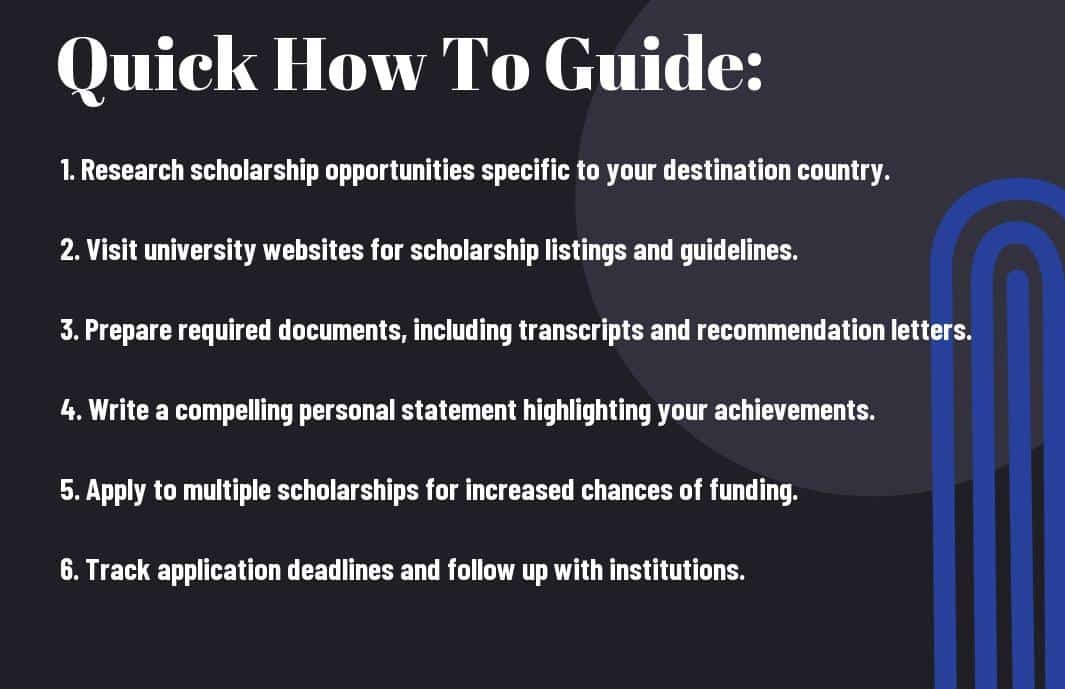Secure Scholarships Students often face the challenge of funding their foreign education, and understanding how to navigate the scholarship landscape can be overwhelming. He, she, or they can enhance their opportunities by thoroughly researching available scholarships, crafting strong applications, and meeting all deadlines. Utilizing resources such as university websites and scholarship databases is necessary. Networking with alumni and mentors can provide valuable insights and connections that may lead to funding. By employing effective strategies and focusing on their strengths, international students can increase their chances of securing financial support for their studies abroad.
Key Takeaways:
- Research various scholarship opportunities offered by universities, organizations, and governments specific to international students.
- Eligibility criteria can vary widely; always check prerequisites before applying to ensure you meet the requirements.
- Application materials like essays, recommendation letters, and transcripts should be tailored to highlight your strengths and achievements effectively.
- Deadlines are important; keep a calendar of all submission dates to avoid missing out on potential funding.
- Networking with current and former international students can provide insights and tips for securing scholarships.
Understanding Scholarships for International Students
The landscape of education is vast, especially for international students seeking to pursue higher studies abroad. They often encounter various financial challenges, which is where scholarships come into play. Scholarships serve as a substantial financial aid that can cover tuition fees, living expenses, and other education-related costs. Understanding scholarships is imperative for international students aiming to maximize their educational opportunities without the burden of excessive debt.
What Are Secure Scholarships?
If international students aim to alleviate financial pressure while pursuing their studies, they should consider the role of scholarships. These are forms of financial aid that do not require repayment, awarded based on various criteria such as academic merit, need, or specific talents. Scholarships can be funded by governments, educational institutions, or private organizations, making them a diverse option for students worldwide.
Types of Scholarships Available
If he or she is considering applying for scholarships, it is imperative to understand the different types that are available. Scholarships can be categorized into various segments, including merit-based scholarships, need-based scholarships, athletic scholarships, and special category scholarships (like for students from specific countries or fields). Each type serves different purposes and caters to specific student demographics, making it imperative for applicants to identify which best suits their situation.
| Type of Scholarship | Description |
|---|---|
| Merit-Based | Awarded based on academic performance or achievements. |
| Need-Based | Targeted towards students demonstrating financial hardship. |
| Athletic | Given to students excelling in specific sports. |
| Special Category | Aimed at students from specific countries or fields of study. |
| External | Funded by private organizations or foundations. |
Scholarships can significantly impact an international student’s journey, relieving them of financial strain and allowing them to focus on their studies. Understanding the types of scholarships available helps students tailor their applications effectively. Each scholarship type has distinct eligibility requirements and application procedures, so it is imperative to investigate which align with their profile.
- Merit-Based Scholarship
- Need-Based Scholarship
- Athletic Scholarship
- Special Category Scholarship
- External Scholarship
After identifying the types of scholarships available, he or she should not overlook the importance of preparing well-crafted applications to enhance their chances of securing funding. Each scholarship may require specific documentation and essays, emphasizing the student’s achievements, goals, and need for financial support. An organized approach to researching and applying for scholarships can lead to successful outcomes for international students.
| Scholarship Details | Information |
|---|---|
| Eligibility | Criteria vary by scholarship type and provider. |
| Application Process | Procedures can include essays, interviews, or recommendations. |
| Funding Coverage | May cover tuition, living costs, or other educational expenses. |
| Renewal Opportunities | Some scholarships are renewable based on performance. |
| Application Deadlines | Vary widely and must be adhered to for consideration. |
Scholarships play a vital role in making education accessible for international students by easing financial burdens while providing opportunities to excel in their studies. Understanding the nuances of scholarships helps international students take empowered steps toward education financing.

How to Identify Scholarship Opportunities
While seeking scholarships, international students must equip themselves with effective strategies to uncover available opportunities. Identifying suitable scholarships can be daunting, but with a systematic approach, they can improve their chances of finding the right funding. Researching scholarship providers is an vital first step in this journey.
Researching Scholarship Providers
While exploring scholarship options, he or she should focus on reputable organizations, government bodies, and educational institutions that offer scholarships specifically for international students. Many universities have dedicated scholarship funds for which international students are eligible, often requiring students to apply directly through the school’s admissions office. Additionally, various private organizations and foundations offer scholarships based on merit, need, or specific demographics such as nationality or field of study.
Investing time in understanding the mission and scope of potential scholarship providers can help them find scholarships that align with their academic pursuits and personal backgrounds. By filtering opportunities based on their eligibility, interests, and goals, students can effectively navigate the substantial amount of information available.
Utilizing Online Scholarship Databases
Now, leveraging online scholarship databases can significantly enhance the scholarship search process for international students. Numerous websites provide extensive listings of scholarships available to students worldwide, often categorizing them by country, field of study, and eligibility requirements. By creating a tailored profile, students can receive personalized alerts about scholarships that match their criteria.
Scholarship databases also frequently offer resources, such as application tips, deadlines, and eligibility checks, which can guide students in their pursuit of funding. By accessing these comprehensive platforms, students can streamline their search and uncover scholarships they may not have found through traditional means.
Networking with Alumni and Current Students
On the journey to securing scholarships, networking can be an effective strategy for international students. Engaging with alumni and current students allows individuals to gain insights into available opportunities and the application processes that worked well for others. Universities often have alumni networks or online forums where students can reach out to graduates in their intended fields of study.
Scholarship seekers can benefit from these connections by asking questions, discussing experiences, and learning about lesser-known scholarship options that alumni may have encountered during their studies. Creating relationships within their target academic environments not only builds potential mentorship opportunities but also enhances their knowledge of funding resources.
Tips for Crafting a Standout Application

Unlike many applicants who submit generic documents, those pursuing scholarships for international students need to develop a distinctive application. A compelling application highlights an individual’s unique strengths and aspirations. Here are some necessary tips for creating an application that captivates scholarship committees:
- Conduct thorough research on scholarship requirements.
- Craft a personalized statement aligning with the scholarship’s objectives.
- Request letters of recommendation from credible sources.
- Showcase relevant achievements and experiences.
- Proofread documents to eliminate errors.
The effort invested in a well-crafted application can significantly enhance the chances of securing funding.
Tailoring Your Personal Statement
With a personal statement, candidates can notably convey their aspirations and passions. She should focus on aligning her narrative with the scholarship’s purpose and values. They need to ensure that her statement reflects genuine enthusiasm, detailing how she intends to leverage the scholarship for personal and professional growth.
Moreover, candidates should include specific examples that illustrate their commitment and dedication. By weaving together personal stories, achievements, and future goals, they can create a richer, more compelling narrative that stands out in the evaluation process.
Obtaining Strong Letters of Recommendation
Strong letters of recommendation can significantly influence an application’s success. They should seek out individuals who can provide insightful perspectives on their qualifications and character. Ideally, these individuals should be familiar with their academic or professional endeavors and be able to articulate how they have excelled in relevant areas.
Additionally, candidates may guide their recommenders by providing details about the scholarship and what it entails. By sharing personal achievements and aspirations, they can help referrers to craft tailored letters that resonate with scholarship reviewers.
Recommendation letters can provide a personal touch to an application that fully embodies the candidate’s strengths. This narrative will give the scholars authentic insights into who they are, promoting a more engaging application overall.
Highlighting Relevant Achievements and Experience
Obtaining the right balance of accomplishments and experience is necessary to underscores one’s qualifications. Candidates should prioritize showcasing achievements that align with the scholarship’s criteria. He or she must remember to include specific details, such as leadership roles, community involvement, or academic honors that demonstrate their capabilities.
In addition, candidates should also consider how their experiences align with their future goals. By connecting their past experiences to their journey, they can illustrate their commitment to the area of study the scholarship represents.
Your achievements not only demonstrate capability but also reflect resilience, ambition, and a proactive attitude. Crafting an application that highlights these aspects is vital for making a lasting impression on scholarship committees.

Factors That Influence Scholarship Selection
Your success in securing a scholarship as an international student can be shaped by several key factors. Understanding these elements can significantly enhance the chance of earning financial assistance. The main factors include:
- Academic performance and transcripts
- Extracurricular involvement
- Financial need considerations
Perceiving these factors can help candidates prepare more effectively when applying for scholarships, leading to a stronger application and higher likelihood of acceptance.
Academic Performance and Transcripts
Even though various institutions have unique criteria, the importance of academic performance cannot be overstated. Scholarship committees typically look for students who have maintained a strong GPA, evidencing their capability to handle rigorous academic challenges. Submitting detailed transcripts that showcase consistent academic excellence may significantly influence decisions, as these documents act as a reflection of a student’s dedication and intellectual perseverance.
Furthermore, students should aim to highlight any advanced courses or honors classes that may contribute positively to their academic profile. In addition to grades, standardized test scores can also come into play; thus, candidates are encouraged to present their results wherever feasible to bolster their applications. These aspects collectively create a competitive advantage in the scholarship selection process.
Extracurricular Involvement
That said, extracurricular involvement plays a vital role in scholarship selection. Many scholarship committees evaluate a candidate’s commitment to areas outside of academics, such as volunteer work, clubs, sports, and other organizations. These activities not only reflect a student’s character but also demonstrate their leadership skills and ability to balance various responsibilities.
Moreover, actively participating in community service or holding leadership positions in clubs can underline an individual’s dedication to their community and personal growth. Such involvement may indicate a willingness to contribute positively to the institution and society at large, which is an appealing trait for scholarship providers. Transcripts of extracurricular activities along with letters of recommendation supporting the student’s involvement may enhance an application significantly.
Transcripts and reference letters that detail involvement in significant extracurricular activities can serve as robust incentives for scholarship committees. Showcasing accomplishments in this area helps candidates stand out from the competition, illustrating they possess a well-rounded character and are more than just their grades.
Financial Need Considerations
Now, financial need considerations represent a significant aspect of scholarship selection. Many organizations and institutions prioritize applicants who demonstrate a pressing need for financial assistance. Scholarships designed to alleviate burdens for students from lower income families or underserved backgrounds can make a remarkable difference in their educational journeys. Candidates are often required to submit documentation to substantiate their financial status, which may include income statements and other relevant financial information.
Additionally, scholarship committees often review how financial need aligns with the goals of their scholarship program. This alignment can affect whether financial need ultimately becomes a deciding factor in selection, influencing their final decisions significantly. For many scholars, showcasing genuine financial needs coupled with their academic and extracurricular achievements can create a compelling scholarship application.
Academic aspects, paired with compelling financial need narratives, provide a comprehensive view of a candidate’s situation. Such details can evoke more understanding and support from scholarship providers, illustrating how financial assistance can facilitate their educational goals.

How to Prepare for Interviews
Keep in mind that the interview process is often a pivotal moment in securing scholarships for international students. They provide an opportunity for candidates to demonstrate their motivations, aspirations, and unique qualities that set them apart from other applicants. Proper preparation for these interviews can significantly increase the chances of being awarded a scholarship. Candidates must pay careful attention to their answers, demeanor, and overall presentation during the interview.
Common Scholarship Interview Questions
One might encounter a variety of questions during scholarship interviews, ranging from academic achievements to long-term career aspirations. Candidates should be prepared to answer questions like, “Why do you want to study at this institution?” or “What contributions will you make to our campus community?” Answering these questions confidently and authentically can demonstrate a candidate’s enthusiasm and commitment to their chosen field of study. Additionally, some interviewers may ask about past challenges and how the candidate overcame them, which can provide insight into their resilience and problem-solving skills.
It’s also necessary to be ready for more specific questions related to the scholarship itself. Queries such as “How will this scholarship help you achieve your goals?” allow candidates to articulate their ambitions and how financial support will enable them to reach their potential. By understanding the scholarship’s values and what it seeks in candidates, he, she, or they can tailor their responses accordingly.
Practicing Effective Communication Skills
To successfully convey their messages, candidates should practice effective communication skills in preparation for interviews. This includes articulating thoughts clearly, maintaining eye contact, and displaying confident body language. Engaging in mock interviews can also be beneficial to help familiarize themselves with the interview format and reduce anxiety. Additionally, candidates can enhance their communication by asking for feedback from peers or mentors, which can help identify areas for improvement.
Questions about a candidate’s experiences and motivations are expected during scholarship interviews. Thus, he, she, or they should practice providing concise, informative responses that directly address the questions asked while showcasing their unique qualities. This allows candidates to build rapport and demonstrate their fit for the scholarship they are pursuing.
Dress Code and Professionalism
An important aspect of interview preparation involves understanding the appropriate dress code and maintaining professionalism throughout the process. Scholarship committees often take note of how candidates present themselves, as it reflects their seriousness and respect for the opportunity. Dressing in business attire, such as a suit or formal dress, is generally advisable. This approach not only makes a positive impression but also boosts the candidate’s confidence during the interview.
A candidate’s professionalism extends beyond attire; it includes punctuality, courtesy, and preparedness. Arriving on time and thanking the interviewers at the end of the session are simple yet effective ways to leave a lasting impression. Furthermore, candidates should conduct research on the organization offering the scholarship so they can discuss relevant topics and demonstrate their genuine interest.
After the Application: Following Up
Many international students may wonder what steps to take after submitting their scholarship applications. Following up is a critical stage, as it can show commitment and professionalism. Students can enhance their chances of securing scholarships by maintaining communication with the scholarship committees. This process includes sending thank you notes, inquiring about the selection process, and understanding the terms and conditions associated with the scholarship.
Sending Thank You Notes
If a student receives confirmation of their application submission, sending a thank you note is an excellent way to express gratitude. It reflects appreciation for the opportunity and acknowledges the effort that goes into reviewing applications. A concise thank you note can leave a lasting impression on the scholarship committee and strengthen the candidate’s recognition in the selection process.
In addition to thanking the committee for considering their application, students can use this opportunity to reiterate their interest in the scholarship. Highlighting specific aspects of how the scholarship will help achieve their academic and professional goals can reinforce a student’s commitment and motivation. Such personalized details may resonate positively with those reviewing candidates.
Inquiring About the Selection Process
An international student may also choose to inquire about the selection process after submitting their application. This not only shows initiative but also helps them understand the timelines and criteria involved. A polite email or message can request updates or indicate a specific interest in learning how the selection committee evaluates candidates. Such inquiries can provide valuable insight into the scholarship’s decision-making process and could influence the committee’s perception of the applicant.
This inquiry should be approached with careful consideration to ensure that it does not come across as impatient or presumptuous. Asking for general information about when decisions are typically announced or how many applicants are vying for the award can be helpful. Timely and respectful communication can foster a positive image of the candidate, showcasing their eagerness and seriousness regarding the scholarship.
Understanding the Scholarship Terms and Conditions
Sending the scholarship terms and conditions should be a priority once they receive any positive confirmation regarding the scholarship. Students should thoroughly read and comprehend the requirements associated with the award, including any obligations they are expected to fulfill post-awarding. Recognizing how the scholarship ties into their academic and financial situation will prevent any misunderstandings and can inform their future decisions.
Further, students may contact the scholarship provider for clarification on specific terms if anything requires more understanding. Often, significant rules regarding eligibility maintenance, reporting requirements, and financial disbursements can impact the student’s experience. Taking the initiative to clarify details not only underscores the student’s seriousness but also prepares them for compliant participation in the scholarship program.
Thanking the scholarship committee after receiving the award can further solidify a positive rapport, potentially opening doors to future opportunities within the organization. Students who demonstrate professionalism and gratitude throughout the entire process often find themselves in favorable positions, paving the way for long-term success in their academic journey.
Also Read : Smart Strategies – How To Obtain Private Student Loans Without Stress
To wrap up
From above, it is clear that securing scholarships for international students requires a well-structured approach and thorough research. They should begin by identifying the suitable scholarships that align with their academic goals and backgrounds. By compiling a list of potential funding sources, they can then focus on tailoring their application materials, such as personal statements and recommendation letters, to highlight their unique qualifications and experiences. It is also beneficial for them to keep track of deadlines and submission requirements to ensure a smooth application process.
Additionally, engaging with scholarship advisors and utilizing online resources can provide targeted guidance and support. They should actively participate in forums or communities where previous scholarship recipients share their insights. Furthermore, leveraging networking opportunities with institutions or alumni may open doors to lesser-known scholarships. Ultimately, persistence and diligence in the scholarship search process can significantly enhance their chances of receiving funding to support their education abroad.
FAQs
Q: What types of scholarships are available for international students?
A: International students can apply for various types of scholarships, including merit-based scholarships, need-based scholarships, government scholarships, university-specific scholarships, and private organization scholarships. Each of these scholarships has different eligibility criteria and application processes, so it’s important to research each option thoroughly to find the best fit.
Q: How can I find scholarships for international students?
A: There are several ways to find scholarships for international students. Start by checking the financial aid section of the university you wish to attend, as many institutions offer scholarships specifically for international applicants. Additionally, websites such as ScholarshipPortal, Fastweb, and the International Scholarships database can provide information about various scholarships. Networking with current students and academic advisors can also be beneficial in discovering lesser-known opportunities.
Q: What documents are typically required to apply for scholarships?
A: Scholarship applications generally require several key documents, such as academic transcripts, letters of recommendation, a personal statement or essay, proof of language proficiency (if applicable), and a resume or CV highlighting your achievements and experiences. Some scholarships may also request financial information or additional documentation, so be sure to read the application guidelines carefully.
Q: How can I write a strong personal statement for scholarship applications?
A: A strong personal statement should clearly articulate your academic achievements, career goals, and the reasons you are applying for the scholarship. Begin with a compelling introduction to capture the reader’s interest, then discuss your experiences, challenges, and motivations in a structured manner. Be specific about how the scholarship will help you achieve your goals, and conclude by emphasizing your commitment to contributing to the community or field of study. It’s helpful to proofread your statement and seek feedback from others.
Q: Are there scholarships available for specific fields of study?
A: Yes, many scholarships target specific fields of study, such as engineering, healthcare, technology, arts, and social sciences. Professional organizations, foundations, and universities often create these scholarships to promote academic excellence in particular disciplines. It’s beneficial to identify scholarships that align with your chosen area of study and to tailor your applications accordingly.



